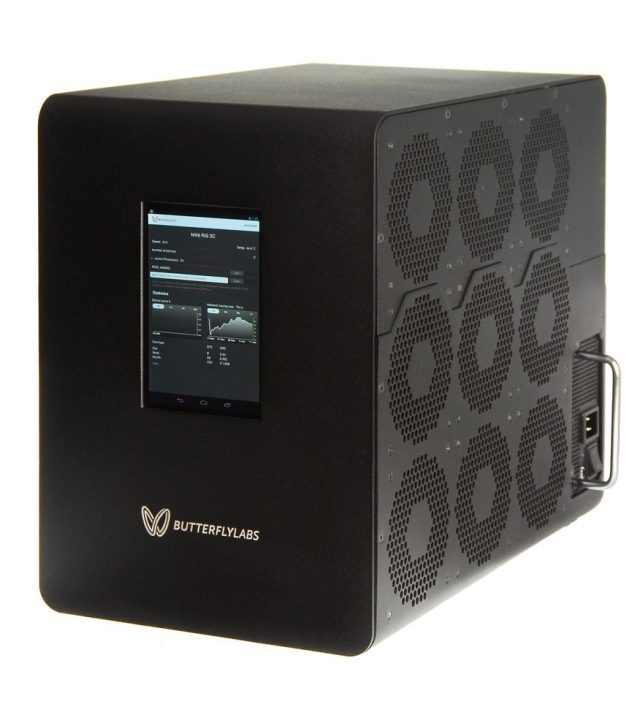
The more I dig into Bitcoin, the stranger it gets. There’s gray-market online gambling and Russian-operated futures markets—to say nothing of the virtual currency’s wild ride over the last several months. It’s full of characters with names like “artforz” and “Tycho,” supposedly two of the largest Bitcoin holders out there. Of course, like most things Bitcoin, it’s nearly impossible to know for sure.
While reporting on a Bitcoin-based gambling story earlier this year, I interviewed Bryan Micon, who works with a Bitcoin-based poker site called Seals With Clubs. (To continue the lack of information, Micon won’t say who owns the site.) Micon has taken it upon himself to investigate what he believes are Bitcoin-related scams—such as the ill-fated Bitcoin Savings and Trust online bank—and he makes public pronouncements about them.
His latest target is Butterfly Labs (BFL), a US-based company that makes ASIC-based Bitcoin miners. In other words, BFL builds little boxes with specialized chips that do nothing but compute hashes in the Bitcoin blockchain—a process which can lead to real money for the miners. BFL had some experience in the Bitcoin mining business; it had previously made and sold around 2,300 slower Field-Programmable Gate Array (FPGAs) miners from September 2011 to September 2012, earning at least $1.6 million in revenue. In June 2012, BFL started taking orders on the ASIC-based boxes, which ranged in price and capability from $274 for a 5 GH/s (gigahashes per second) unit to $22,484 for a 500 GH/s machine.
New orders for the next-generation machines flooded in. The privately held company won’t say how many orders it received, but if one site inviting customers to add their orders to a public list is to be believed, BFL has taken in at least 6,000 orders worth $7.8 million—and the actual numbers may be higher.
BFL initially estimated a ship date of late November 2012, but the deadline passed and the ASIC machines didn't appear. Customers got progressively more agitated. In January 2013, Micon wrote on the Bitcoin Forum, the go-to locale for Bitcoin-related discussion, that he "smelled a rat":
My personal best-guess as to what is going on in general at BFL is that they collected a massive amount (many millions when delimited in USD, exact figure unknown) of pre-orders, thought whatever sourcing they had contracted with could produce working ASIC chips, then there were many delays for many technical reasons likely costing BFL more money, so they responded by massively increasing advertising for more pre-orders. Many ads that are floating around Bitcointalk still say simply "xx Gh/s for $xxx Butterfly labs" when they are clearly not capable of shipping said product at this time. It is impossible to know the exact current state of the company, but it is my impression after my personal interactions with the company executives that they are stressed and lying to the public. They may have a hail-Mary play gambling community pre-order money on another run of chips, or they may have absolutely no product and are collecting as much as possible before they go belly-up, either legally with a chapter whatever bankruptcy or illegally by jumping on a plane with a thumbdrive full of BTC. 1 man's thoughts, 1 man's investigation. I smell a rat and I think this one may set the record for biggest btc community loss.
Soon after, Micon put his bitcoins where his mouth was, placing bets on the BFL's ability to deliver hardware:
At least one ASIC-based Butterfly Labs product will demonstrate 350 Mhash/Joule or more, at stock frequency/voltage, at room temperature, for a sustained period of time of at least 60 minutes, with appropriate current-measuring equipment on the device's power input(s). Power consumption shall be measured by adding up current from all the device's DC inputs (12V jack, USB cable, etc.) It will not be measured "at the wall." The purpose of this bet is to avoid wildly varying efficiencies of power adapters and computer hosts. This bet applies to all ASIC-based products that Butterfly Labs will deliver to the general public. This includes the "SuperComputer" family (Jalapeno, Single SC, Mini Rig SC), as well as possibly any unannounced product that the company will be shipping by June 30, 2013.
This statement is true if, for example, the Single SC achieves 40 Ghash/s at 114 Watt or less (40000/114 = 351 Mhash/Joule) as measured with a clamp meter on its 12V DC input and 5V (USB) input.
This statement is false if all Butterfly Labs products fail to achieve 350 Mhash/Joule, or if Butterfly Labs fails to deliver any product at all.
Finally, over a year after the first orders were placed, after hundreds of angry comments and reddit threads and tweets (example: “WTF is wrong with you? You can't deliver shit yet u take more $$? Stop fucking delaying Singles on purpose!!”), BFL shipped its first machines in early June 2013. (Ars received a review model of the 5 GH/s low-end "Jalapeño" machine a few weeks earlier in May 2013. Look for our full review soon.)
This month, BFL announced it was selling the bare ASIC chips (without the associated hardware) for $75 apiece. BFL is also crediting chips to customers "as a thank you to our customers for being patient with us" for all orders placed before April 1, 2013.
While BFL battles delays, its competitors—most notably a company called Avalon—have been shipping rival Bitcoin miners.

The bet
But BFL has its defenders. One of them is Marc Bevand, a Southern Californian who took Micon's bet.
“I said [for 40 BTC] that they would not only release hardware and it would match 350 megahashes per watt,” the French engineer told Ars. “And [we have] a second bet [worth 100 BTC] with 150 megahashes per watt. As it turns out, we will both lose and win one bet if the numbers that we see from the current prototypes are realistic. Fortunately, I bet more money on the second one.”
Why is Bevand one of BFL’s biggest cheerleaders?
“I ordered 10 [Field-Programmable Gate Array, or FPGA] singles in June 2012,” he told Ars. “At the time, they were selling for $699 each. And I mined 300 to 500 bitcoins.”
Like a lot of people who claim to have substantial bitcoin holdings, Bevand says that he first began mining back in December 2010—when you reportedly could get 50 bitcoins in an hour on a regular laptop. According to Blockchain.info, by March 2012 one bitcoin was worth less than $5; today, though, each is worth over $106. Bevand says he has made a significant amount of money with BFL hardware.
“In my view, the chance that [BFL] are scammers—that they’ve put so much engineering to scam people with ASICs and not deliver a product—is very small,” he added, explaining his own theory about what happened. “The price that they were selling FPGA hardware was very low. It contains two FPGAs whose market price is about $2,000.
"They sold the singles at $699," Bevand said. "People have theorized that they had a source from the gray market in China to get these chips for very cheap, and this is what allowed them to sell them at a low price. One of them must have had this source in China and met someone in the BTC community who understood the possible market for having a really cheap source of FPGA, so they decided to recruit an engineer. But who is it? Sonny?”
reader comments
96